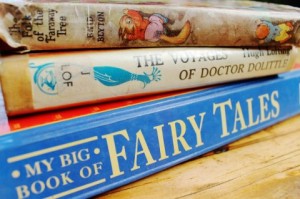 Most often younger readers choose a book because they like the illustration on the front cover! More experienced readers choose books based on their covers too, but they are also likely to choose a book that is on their favourite subject or by familiar author. So, how do you help to broaden what your children read? Here are some ideas:
Most often younger readers choose a book because they like the illustration on the front cover! More experienced readers choose books based on their covers too, but they are also likely to choose a book that is on their favourite subject or by familiar author. So, how do you help to broaden what your children read? Here are some ideas:
- Ask your children’s friends what they have enjoyed reading or ask other parents what their children are reading at the moment.
- Get to know your local librarians and ask them which authors children of a particular age usually enjoy.
- Allow children to put down a borrowed book they don’t like and to choose another one. Remember that children’s tastes change over time, so its best to have as wide a variety of books to choose from as is possible – joining the library helps with this!
- If you are at a bookshop or in the library, take your children with you so that they can help choose books!
- South Africa does not yet publish enough storybooks and novels for children in all our official languages but there are some. Ask at your local library or bookshop whether there is a version of a story you want in your chosen language.
Tips for choosing fiction books:
- Books for babies and pre-schoolers should be in their home language wherever possible. Where you can find books for older children in their home language, encourage them to read these as well as books in an additional language.
- Babies enjoy board books and cloth books and the bonus is that these are virtually indestructible! They respond well to brightly-coloured pictures of objects or people with simple text that has rhythm and/or rhyme.
- Wordless books are a great investment. You can use them to tell a story to your toddler and older children can use them to create their own stories.
- Toddlers and preschoolers enjoy books of rhymes. They also enjoy books in which the text has a strong rhythm, or in which phrases are repeated. Pop-up and flap books are also firm favourites with toddlers.
- For younger readers, look for simple plots with small amounts of text on the page and engaging illustrations. As you read more with your children, they will enjoy books that have more complex plots and more text in them.
- Choose some books that reflect things that will be familiar to your children – for example, books in which the homes look like your children’s. Choose other books that provide new experiences, such as folktales or storiesset in differentplaces and cultures.
- Search on the Internet or in the library for award-winning books.
- For children who are able to read independently, choose a variety of books: books that they can read on their own or to you (recycle the early picture books that you used to read to them for this!); books you can read together and books that you can read to them.
- With novels, look for well-developed stories and plots. If children have a favourite book, they may enjoy other books by the same author.
- Encourage children to try different kinds of books – school stories, space stories, family and friendship stories, nature stories, adventure stories, fantasy and mysteries.
- Picture books and novels about things that are happening in your children’s lives – like the arrival of a new sibling, parents’ divorce or friendship challenges – can help children process their feelings and face their fears.
- Some older children may need books that do not have a lot of text in them and have some illustrations. Books like these that also have stories of interest to older children are not easy to find but some cartoons and graphic novels are available in English.
Tips for choosing non-fiction books:
- Information books are not just for older children. Libraries and bookshops also stock information books for younger readers. These books encourage children to read about topics that interest them and in the processthey learn about how to find information.
- Choose books that appeal to your children’s interests. Flip through the book to see whether the topic is at the appropriate level for your children. A book that is too simple or too advanced may not hold their attention.
- Suggest other books on the same or related topics.
- Some children enjoy reading about real people. Many libraries and bookshops have a small range of abridged or simple biographies and autobiographies as well as full-length ones for more advanced readers.

